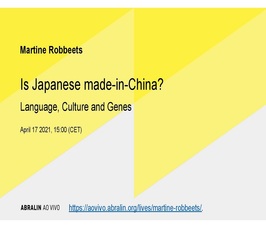Lecture by Prof Martine Robbeets: “Is Japanese made-in-China? Language, culture and genes”
Part of the Abralin ao Vivo – Linguists Online lecture series
- Date: Apr 17, 2021
- Time: 03:00 PM - 04:00 PM (Local Time Germany)
- Speaker: Professor Martine Robbeets
- Location: Online
- Host: Brazilian Linguistic Association

Martine Robbeets is leader of the Archaeolinguistic Research Group at the Max Planck Institute for the Science of Human History in Jena and teaches Transeurasian Linguistics as a Honorary Professor at the University of Mainz. In March she finalized an interdisciplinary research project on the dispersal of the Transeurasian languages, funded by the European Research Council. Previous affiliations include an Associate Professorship of Japanese Linguistics at Leiden University and visiting scholarships at the Universities of Tokyo, Leuven and Mainz. Her publications include "Is Japanese related to Korean, Tungusic, Mongolic and Turkic?" (2005, Harrassowitz), "Diachrony of Verb Morphology" (2015, de Gruyter Mouton) and various journal articles, book chapters and edited volumes.
To learn more about the Abralin ao Vivo series, click here: https://aovivo.abralin.org/en/about/ (external link)